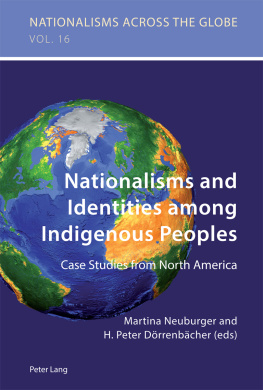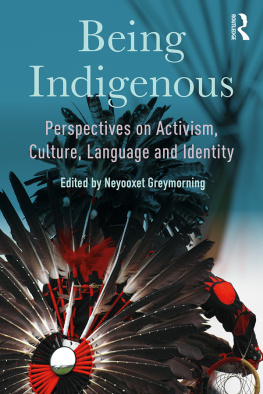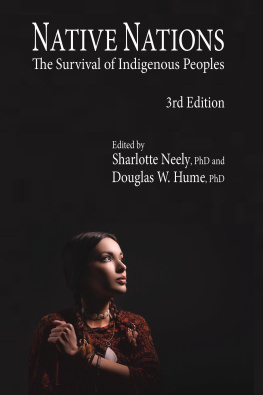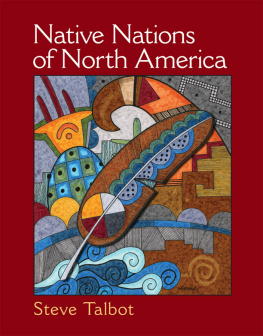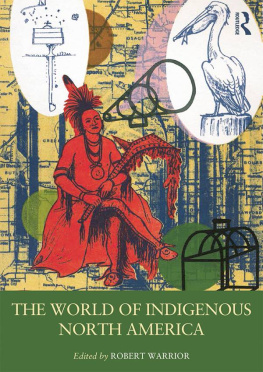Contents
NATIONALISMS ACROSS THE GLOBE
VOL. 16
SERIES EDITORS
Dr Tomasz Kamusella
(University of St Andrews, Scotland, UK)
Dr Krzysztof Jaskuowski
(University of Social Sciences and Humanities, Poland)
EDITORIAL BOARD
Balzs Apor (Dublin)
Peter Burke (Cambridge)
Monika Bar (Groningen)
Andrea Graziosi (Naples)
Akihiro Iwashita (Sapporo)
Sawomir odziski (Warsaw)
Alexander Markarov (Yerevan)
Elena Marushiakova and Veselin Popov (Sofia)
Alexander Maxwell (Wellington)
Anastasia Mitrofanova (Moscow)
Michael Moser (Vienna)
Frank Lorenz Mller (St Andrews)
Sabelo J. Ndlovu-Gatsheni (Pretoria)
Balzs Trencsnyi (Budapest)
Sergei Zhuk (Muncie, Indiana)
PETER LANG
Oxford Bern Berlin Bruxelles Frankfurt am Main New York Wien
Martina Neuburger and H. Peter Drrenbcher (eds)
Nationalisms and Identities among Indigenous Peoples
Case Studies from North America
PETER LANG
Oxford Bern Berlin Bruxelles Frankfurt am Main New York Wien
Bibliographic information published by Die Deutsche Nationalbibliothek.
Die Deutsche Nationalbibliothek lists this publication in the Deutsche Nationalbibliografie; detailed bibliographic data is available on the Internet at http://dnb.d-nb.de.
A catalogue record for this book is available from the British Library.
Library of Congress Cataloging-in-Publication Data
Nationalisms and identities among indigenous peoples : case studies from North
America / edited by Martina Neuburger, H. Peter Drrenbcher.
pages cm. -- (Nationalisms across the globe ; 16)
Includes bibliographical references and index.
ISBN 978-3-0343-0838-0 (alk. paper)
1. Indians of North America--Ethnic identity--Case studies. 2. Indians of North America--Government relations--Case studies. 3. Indians of North America--Politics and government--Case studies. I. Neuburger, Martina, editor of compilation. II. Drrenbcher, H. Peter, editor of compilation.
E98.E85N36 2014
323.1197--dc23
2014030996
Cover image NASA/Goddard Space Flight Center Scientific Visualization Studio
ISSN 1662-9116
ISBN 978-3-0343-0838-0 (print)
ISBN 978-3-0353-0649-1 (eBook)
Peter Lang AG, International Academic Publishers, Bern 2015
Hochfeldstrasse 32, CH-3012 Bern, Switzerland
All rights reserved.
All parts of this publication are protected by copyright.
Any utilisation outside the strict limits of the copyright law, without the permission of the publisher, is forbidden and liable to prosecution.
This applies in particular to reproductions, translations, microfilming, and storage and processing in electronic retrieval systems.
This publication has been peer reviewed.
About the author(s)/editor(s)
Martina Neuburger is Professor of Social and Political Geography at the University of Hamburg, where she researches socio-political processes in rural and peasant societies in Latin America. Her research into vulnerability, poverty and marginalization concentrates on peripheral regions with fragile ecosystems, such as Brazilian and Bolivian Amazonia and the Peruvian Andes.
H. Peter Drrenbcher is Professor of Human Geography at Saarland University, Saarbrcken, where he studies the development and socioeconomic status of border regions and the institutionalization of transboundary regions in western Europe, with a particular focus on FrenchGerman border regions. He also has research interests in the institutionalization of Indigenous regions in northern Quebec.
About the book
This book investigates nationalisms and the emergence of national identities among the Indigenous peoples across North America. It examines the many difficulties which the Native communities have had to face in order to assert themselves as nations, as well as looking at the ambiguity of the term 'nation' within First Nationsgovernment relations. The volume gives a broad perspective on the historical development of Native American nationalism and also explores a variety of political, educational, sociological, cultural and even literary viewpoints. The experiences of the Indigenous peoples are compared with the experiences of other Aboriginal groups across the globe, in order to enrich our understanding of global indigenous nationalisms.
The contributors to this volume represent the perspectives of a variety of different First Nations and a wide range of disciplinary fields, from history, anthropology and political science to communications, law, linguistics and literary studies.
This eBook can be cited
This edition of the eBook can be cited. To enable this we have marked the start and end of a page. In cases where a word straddles a page break, the marker is placed inside the word at exactly the same position as in the physical book. This means that occasionally a word might be bifurcated by this marker.
| 1
First Nations in North America
First Nations of the North American continent can look back on an eventful history of cooperation and conflict with, as well as marginalization and recognition by, colonizing and dominant white society. Before the arrival of Europeans, Indian nations had their specific principles of sovereignty. Their norms, values and customs defined governmental forms, policing, regulation of land use and management of conflicts (Lujan & Adams 2004). They exerted complete and absolute jurisdiction over criminal matters within their territories. European colonization confronted them with expansionistic-minded people who forced them to recognize European laws, customs and beliefs as superior.
In aspects of land tenure, intra-Indian conflicts were altered by the European colonization process due to the expansion of European settlement to Indian territories as well as the enormous reduction of Indian population by European diseases (Adelman & Aron 1999). In some regions, First Nations took advantage of rivalry between the colonial powers and their dependence on Indian allies and traders and shaped the parameters of intercultural trade and military engagement. But in the eighteenth century, in most cases, Native Americans were displaced and left the contested areas and the social context of their communities. Due to the independence of 1 | 2 the USA and Canada and the creation of Indian Reservations, the previous situation of frontiers as areas of contact and exchange between cultures was replaced by borders of nation states and of Indian Reservations.
As continuity of this colonial practice and perspective, First Nations cultural identities are considered as confined within the physical boundaries of reserves. All other spaces, in turn, are defined as settler spaces, creating a framework for the construction of the contemporary nation-states Canada and the USA (Wilson & Peters 2005). Although urban Aboriginal peoples consider themselves to belong to communities in both reserve and city and create a new territory of identity by preserving their connection to their originating community and by practising ethnic ceremonies in new environments, a broad societal recognition of their ethnicity remains difficult for First Nations living within dominant society and urban contexts and practising modern economic activities. The re-territorialization of identity represents a creative ways of reinforcing links to the land in urban environments and an attempt to transform the spatial arrangements that still underlie the binaries of First Nations and settler, reserve and city, primitive and civilized.

